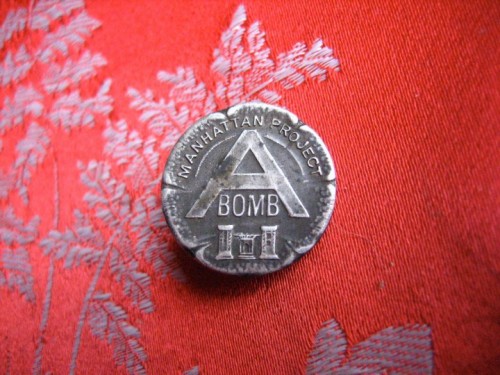Some time back, I set up a Google Alert to forward me, on a daily basis, any news stories that mention the phrase “Manhattan Project.” The not-terribly-surprising result is that I get to see exactly how often people call for new Manhattan Project-like efforts to solve various technical or political problems of our times.
It turns out to be something that is very often called for. More than I had expected. Each and every day, more or less, someone, somewhere, is invoking the Manhattan Project as the be-all and end-all for intense problem solving.

One of the silver Manhattan Project pins issued after the war to individuals who worked on the Manhattan Project for over a year. From my personal collection.
Here is what people seem to mean by calling for a new Manhattan Project:
- Round up all the experts on a given subject. All of them.
- Give them near unlimited resources and allow them to follow each and every possible lead towards solving the problem. Each and every one of them. Even redundantly.
- Expect positive results in three to five years, give or take. What else could the outcome of such an effort be be?
Well, that sounds find and dandy if you support whatever the outcome is meant to be — renewable energy, bird flu studies, understanding autism, fertilizer, nuclear fusion, fighting cancer (just to name a few such ideas floated in the last two weeks alone) — and you believe that it actually works that way.
But here’s the rub: this is a really lousy way to think about what the Manhattan Project was.
Here’s what the Manhattan Project means to me, as an historian of, well, the Manhattan Project:
- Spend a fantastical amount of resources — diverting it from other necessary projects — on something which is actually a huge gamble. We tend to gloss over the fact today that when they started pouring money into the bomb work in 1942 and 1943, there were really quite long odds that it would pay off, and it was a lot harder to pull off than they had originally estimated when they OK’d the project.
- Invest so much into it that the penalty for calling off the work, even if the initial purpose is no longer relevant or feasible, would be institutionally impossible. In fact, invest so much effort into it that the question of whether it ought to be pushed towards completion is essentially unraisable amongst the highest echelon of planners.
- Do all of the above with essentially no external oversight or independent auditing. This is actually a requirement for spending money on such a wildly improbable project at any time when resources are considered scarce — which is always. 1
- Keep all long-term or big-picture planning in the hands of a deliberately small cabal, and rigidly work to keep dissenting views out of view of those who might actually care about them.
- After completing your goal, instead of dismantling the infrastructure and moving on to other problems, you actually expand it considerably, making it several times larger than anyone would have guessed during the initial project.
Now, I hear you saying, “well, Alex, obviously no one who invokes the Manhattan Project means any of that!” Oh, I know. That’s the problem — we’ve turned “the Manhattan Project” into a vague metaphor for scientific effort. But it’s highly misleading. The Manhattan Project was an unusual, somewhat dubious enterprise that had massive, world-affecting consequences. Ignoring that not only misunderstands the Manhattan Project, it misunderstands what happens when you pour essentially unlimited resources into a given field — which actually is the primary goal of those who use this metaphor.
The problem is, the Manhattan Project “worked,” if by “worked” you mean, “produced atomic bombs for use in the Pacific theatre during World War II.” It almost didn’t work — there are plenty of reasons to believe that the war would have been over fairly soon with or without the bombs (the main historical question is not whether it would soon end, but on what terms and at what costs). But because it did “work,” it seems inevitable and even like a good gamble. But the odds were actually incredible long, and it was an incredible accomplishment to actually get that much done in that amount of time — a flattering fact for those who worked on it, but something we tend to gloss over since we know how the story ends. 2
The other problem is that many of the other models one might use had much more ambiguous results. Do we want a “War on Cancer” for our present problems? Probably not, since that didn’t actually end cancer. (It did many good things, to be sure! But it also showed us that “cancer” is a fantastically bigger medical problem to surmount than many people had realized.)
Do we want a “Apollo program” instead? Maybe — getting to the moon first is seen as more or less good thing today by most Americans. But it also has overtones of technical innovation for propaganda’s sake, and in its own time, the technical accomplishments were noticeably complicated by a rupturing domestic scene (riots, Civil Rights, Vietnam, etc.). Of course, the fact that the popular attitude is something along the lines of “we went to the moon, and then space got boring,” doesn’t help. Still, it is probably a more realistic model for what one might want, in terms of time horizons, expenditures, and programs that are actually compatible with democratic institutions.
Ironically, a public call for a new “Manhattan Project” is also something of a logical contradiction. There was no public call for the original Manhattan Project — it was a very private, secret effort by a small group of insiders running off of specialized knowledge that most of the world wasn’t aware even existed. General Groves would have loathed (and would have attempted to censor) an actual public call for making atomic bombs in the 1940s, because it would have completely defeated the goals of the Manhattan Project as they actually existed — secrecy, winning the “race,” avoiding audits, and so on. Calling for a Manhattan Project makes about as much sense as ordering up your own surprise party.
- See my previous post on the Origins of the Nuclear Black Budget for a discussion of these kinds of issues.[↩]
- I’d be remiss not to cite Michael Gordin’s provocative book, Five Days in August: How World War II Became a Nuclear War, which interrogates the “what do we mean by work?” question in wonderful detail. I wrote a review of it awhile back, which you can read here if you are interested.[↩]


Also – don’t forget to add: “create a new and terrifying technology without adequate consideration to social, economic, ethical, political implications.”
Great stuff, Alex! I really enjoy when scholars take a step back and really think about what they are talking about, and attempt to define exactly what they mean. Studying climate change discussions during the 1950s and 60s has taught me an important lesson: definitions matter.
Hey Alex, good analysis –I especially like the point about how metaphors that are intended to be inexact are, as a consequence, overly vague. I did a similar post at my blog during the 2008 Presidential campaign on the competing metaphors of the Manhattan Project and “100,000 garages”:
http://etherwave.wordpress.com/2008/10/09/los-alamos-vs-100000-garages/
Monday morning quarterbacking.
My grandfather fought in the Pacific theater during the war, and without a quick end to it, I, my 3 kids and millions of Japanese and Americans would not be here today.
The arrogance of people today, in their judgments of people in the past is astounding. You are standing on the shoulders of giants, and mock them for being underneath you.
Flip it around! Do you want to be unfairly judged by your great, great grand children? …and thought of as selfish, egoistical idiots for our best accouterments of the 21st century? I’m talking about the deeds we are proud of! …well, these same deeds may cause massive problems in the future. Who knows?
What a generation does in their OWN time should only be judged by their generation in their own time. What we do today in 2012 seems to us “the right thing to do”, but we have no idea what good or bad our actions (or in-actions) will cause the future world. Actions bounce and echo through the ages and multiply as the do.
Actions, such as to control the weather, go to Mars, push stem cell research or in-actions to address over-population, preserve our constitution and save (or re-purpose) the forests. In our time, we do what we can, as we can, and can only use today’s knowledge to do it.
Mocking good people of the past, who held and saw through a virtuous goal (end the war quickly), is very small minded and smacks of narcissistic arrogance! Humbleness is a trait today’s generation seems to know very little of. Let’s just hope future generations are more “grown-up”, and not judge us a harshly.
I think you seem to be confused as to what I’m saying, here.
I’m not arguing that they should or shouldn’t have done the Manhattan Project. I’m not arguing that they should or shouldn’t have dropped the atomic bombs.
What I’m discussing is whether or not the Manhattan Project should be considered a model of sure-fire technological success, and whether it would have stood up to external (e.g. public or Congressional) scrutiny in its own time. It shouldn’t; it wouldn’t have. It was a huge, unlikely, expensive gamble. It was recognized as a gamble in its own time. It was one that paid off, by the standards of those who took it. But a huge gamble nonetheless, and one that required a massive amount of deception and secrecy to maintain — specifically because it could not have stood up to real scrutiny.
This is not “quarterbacking,” this is historical understanding. A simple demonstration: the original cost estimate for making an atomic bomb, when the US went all-out into the effort, was $400 million. The actual cost was $2 billion. From a strictly financial perspective, they were off by a factor of five.
One might jump from there to the question of “Was it worth it?,” but that’s not what I’m discussing here. I’m just pointing out that the bomb effort shouldn’t be a model of a “sure thing,” and should not be something we routinely want to pattern our scientific investment efforts on.
It might be worth explicitly noting that “produce atomic bombs for use in the Pacific theatre during World War II” was NOT the original goal of the project. The basis and goal for long time was to produce atomic bombs for use against Germany. Japan became target because that target failed – the war against Germany ended first.
That in fact points out very well the very point is made in the entry. Once the original goal was no longer applicable, the project was not shut down – instead the goal was changed. Had the war with Japanese ended before the bomb was ready, no doubt there would’ve been another opponent that would’ve ‘required’ continuing the project (Soviet Union?).
Good points, thanks.
[…] Do We Want Another Manhattan Project? (4/2/2012) […]
[…] how about we press “reset” when some pundit or politician says “We need another Manhattan Project for X” or harkens back to the “glory days” of Apollo program when we were supposedly all pulling […]
My mother lived with my wife and I for about 3 years before she died (about 4 yrs.ago). While she was here,I was going through her cedar chest,when I found A sterling silver Manhatten Project pin and a letter from the Secratary of War,thanking my grandfather for working on the Manhattan Project. Iasked my mother about my grandfather and what he did. I knew he work many years with G.E.,but not a clue about the Manhattan Project. My Mother told me she didn’t know what he did and my grandmother told her,don’t eeven think about asking what he did. My mother said he and 3 other men drove from Yakima, WA everyday to the Hanford site and that’s all she knew. My mother was a Marine during the war. I spent every summer and all holidays at my grandparents place and now wonder if all the weird medical problems I and my siblings have had are because of spending so much time in Yakima,as children. I have no idea what he may have drug home from Hanford.He died when I was faily young (maybe 10). but I rember him as being totally screwed up physicaly. Supposedly he had Arthritis,but I think he died from the effects of Hanford. Anyone else heard of offsspring having a lot of weird medical problems. I would be more than willing to go into detail about some of the issues,if requested.
Hi, Mike: There hasn’t been too much systemic study of the children of Manhattan Project employees, that I have seen, anyway. (Someone else asked me about this awhile back, so I briefly searched around.) There has been at least one news article about Los Alamos children from 2008 (which mentions a lawsuit, which might provide more fact-finding), and there have been epidemiological studies of cancer among Los Alamos residents, but they are more recent. I don’t know of any who studied Hanford or Oak Ridge in this capacity, though it’s not impossible that there was some kind of study. It would have to be fairly long-term to catch these kinds of effects in a systemic way, though. It can be very hard to sort out causation and correlation in cases like this, but it would not surprise me to find that the families of people who worked in these early sites were affected by things brought back on the clothes of workers, leaks and ventings, and so forth.
[…] since I set up an e-mail alert for the phrase, “Manhattan Project,”1 I’ve been getting an interesting cross-section of discussions on the Internet about […]